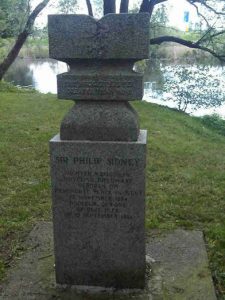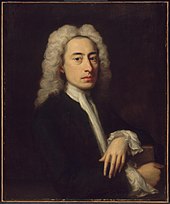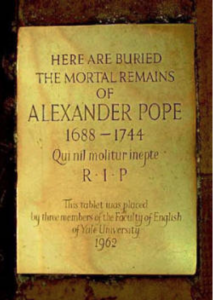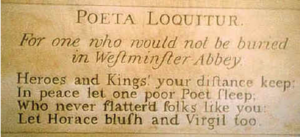Prezi Link:
Category: Uncategorized
Mary Leapor

Mary Leapor was born on February 26,1722 in Northamptonshire. Mary Leapor was an only child. Her father worked in the gardens in Brackley so she spent a majority of her time there as a child. At a very young age of 10, Mary started to write and her parents highly discouraged doing so. This was an interesting point that I have read. She was looked at to be the greatest female poet of her time, and her parents discouraged it. She “probably” attended the local school of Brackley. Getting into Mary’s teen years, she got a job working as a kitchen maid at Weston Hall, which was near Brackley, where she had resources available to her in the library. After that job, she took on another job of similar nature but instead in a man’s family in the Edgcote House. She lived in Crumble Hall, which she wrote a poem on later in life. In the year of 1745, Leapor returned to Brackley into her original house with her father. During this time she met a lady named Bridget Freemantle who helped shape her life. Freemantle read one of Leapor’s verses that she had wrote and tried to submit it for a play in a tragedy she composed. Before the verses could be turned into anything significant, Mary Leapor became very ill with measles at the age of 24. She was buried in Brackley on November 14, 1746.
Leaper’s verses can be compared to those of Pope and Swift. Mary Leapor is one of the leading women poets of her century. Her poems are shaped by her experiences as an outsider economically and as a woman of her day. Being that she was female, it is impressive to look at how far she was able to go with her writing. She did not have the advantages of what a male may have gotten in her day or even the advantage of having money to help her. It is interesting to note how she grew up in a lower class, working for people of more wealth than her. Going against her parents’ word, she kept writing. I would say that it is possible that her parents discouraging her led her to wanting to write more. Fortunately for her, this helped shape her as a writer which led to her being considered one of the greatest female poets of her century.
WORKS CITED
Greene, Mary Leapor: a study in eighteenth-century women’s poetry (1993) · M. Leapor, Poems on several occasions, 2 vols.(1748–51)· parish register, Brackley, Northants. RO · GM, 1st ser., 54 (1784) · B. W. Rizzo, ‘Christopher Smart, the “C.S.” poems, and Molly Leapor’s epitaph’, The Library, 6th ser., 5 (1983), 22–31 · G. Sitwell, A brief history of Weston Hall, Northamptonshire (1927)
Stuart Gillespie, ‘Leapor, Mary (1722–1746)’, Oxford Dictionary of National Biography, Oxford University Press, 2004 [http://www.oxforddnb.com/view/article/16246, accessed 9 Oct 2017]
King Lear: Brief Glossary/Translation of Words
By: Loren Miller
King Lear
William Shakespeare
Glossary/Translation of Words
(From beginning to end)
Definition: A half, one of two equal parts. (O.E.D.)
Ex. from the work:
“…that curiosity in neither can make choice of either’s moiety.” (p.1255; 1.1 5-6)
Definition: Offspring, children, descendants (also occas. with singular reference). Also occas. with reference to animals. Also fig. Now chiefly in legal contexts or with reference to family history. (O.E.D.) 5a.
Ex. from the work:
“I cannot wish the fault undone, the issue of it being so proper.” (p.1255; 1.1 16-17)
Definition: In weakened use. A man or boy whose behaviour invites disapproval, but who is nonetheless likeable; a wag, a rogue (rogue n. 3). Frequently as a term of endearment, or as a playful term of reproof. (O.E.D.) 3b.
Ex. from the work:
“Though this knave came something saucily into the world before he was sent for, yet was his mother fair; there was good sport at his making, and the whoreson must be acknowledged.” (p.1255; 1.1 20-23)
Definition: The characteristic epithet of persons in the relation of feudal superior and vassal. (O.E.D.)
Ex. from the work:
“I shall, my liege.” (p.1255; 1.1 34)
Definition: To express, utter. (O.E.D.) 4d.
Ex. from the work:
“Sir, I love you more than words can wield the matter…” (p. 1256; 1.1 53-54)
Definition: Obligation, duty. (O.E.D) 6b.
Ex. from the work:
“I love your majesty according to my bond; no more nor less.” (p. 1257; 1.1 92-93)
Definition: Perhaps, possibly; maybe. (O.E.D.)
Ex. from the work:
“Haply, when I shall wed, that Lord whose hand must take my plight shall carry half my love with him, half my care and duty.” (p. 1257; 1.1 100-02)
Definition: To pledge or bind oneself to do or give (something); to promise. (O.E.D.) 3.
Ex. from the work:
“Haply, when I shall wed, that Lord whose hand must take my plight shall carry half my love with him, half my care and duty.” (p.1257; 1.1 100-02)
Definition: In ancient Greek mythology, a goddess, said to be of Thracian origin, daughter of Perses and Asteria; in later times more or less identified with several others, esp. with Artemis. (O.E.D.)
Ex. from the work:
“For, by the sacred radiance of the sun, the mysteries of Hecate, and the night…” (p. 1257; 1.1 110-11)
Definition: Of or relating to Scythia, an ancient region extending over a large part of European and Asiatic Russia, or to the nomadic people by whom it was inhabited. (O.E.D.)
Ex. from the work:
“The barbarous Scythian, or he that makes his generation messes to gorge his appetite, shall to my bosom be as well neighbored, pitied, and relieved, as thou my sometime daughter.” (p. 1257; 117-19)
Definition: A small or inferior crown; spec. a crown denoting a dignity inferior to that of the sovereign, worn by the nobility, and varying in form according to rank.
Ex. from the work:
“Only we still retain the name, and all the additions to a king; the sway, revenue, execution of the rest, beloved son, be yours; which to confirm, this coronet part betwixt you.” (p. 1258; 1.1 136-40)
Definition: Between prep., adv., and n., in the various senses of that word. (O.E.D.)
Ex. from the work:
“Only we still retain the name, and all the additions to a king; the sway, revenue, execution of the rest, beloved son, be yours; which to confirm, this coronet part betwixt you.” (p. 1258; 1.1 136-40)
Definition: An unbeliever; a heretic, infidel. (O.E.D.) B1a.
Ex. from the work:
“O, vassal! miscreant!” (p.1258; 1.1 164)
Definition: A person who breaks allegiance or faith, or neglects a duty; an apostate, a deserter. Also gen., as a term of abuse: a villain. (O.E.D.) 2a.
Ex. from the work:
“Hear me, recreant!” (p.1259; 1.1 169)
Definition: A ceremonial act or expression as a tribute of courtesy. (O.E.D.)
Ex. from the work:
“There is further compliment of leave-taking between France and him.” (p. 1262; 1.1 303-04)
Definition: A foolish person, a fool. (O.E.D.)
Ex. from the work:
“…Go to creating a whole tribe of fops…” (p. 1263; 1.2 14)
Definition: To succeed or prosper; to meet with success or good fortune; to attain one’s purpose or desire. (O.E.D.)
Ex. from the work:
“Well, my legitimate, if this letter speed, and my invention thrive, Edmund the base shall top the legitimate.” (p. 1263; 1.2 19-21)
Definition: To pre-arrange (something). (O.E.D.) 11a.
Ex. from the work:
“I pray you; frame the business after your own wisdom.” (p.1264-65; 1.2 28-99)
Definition: A particular instance of such behaviour; a gluttonous act; an excessive indulgence in food or drink, esp. one leading to discomfort or illness. (O.E.D.) 1b.
Ex. from the work:
“This is the excellent foppery of the world, that, when we are sick in fortune, often the surfeit of our own behavior, we make guilty of our disasters the sun, the moon, and the stars…” (p. 1265; 1.2 117-20)
Definition: To avoid, shun; to keep away from or keep from interfering with; to leave alone. (O.E.D.) 4c.
Ex. from the work:
“Bethink yourself wherein you may have offended him; and at my entreaty forbear his presence till some little time hath qualified the heat of his displeasure…” (p. 1266; 1.2 156-58)
Definition: To censure, find fault with, carp at. (O.E.D.) b.
Ex. from the work:
“His knights grow riotous, and himself upbraids us on every trifle.” (p. 1267; 1.3 7-8)
Definition: Void of meaning or sense; foolish, silly, incoherent; also (of persons) light-headed, out of one’s mind, delirious. (O.E.D.) 2b.
Ex. from the work:
“Idle old man, that still would manage those authorities that he hath given away!” (p. 1267; 1.3 17-19)
Definition: A cap worn by a professional fool. (O.E.D.)
Ex. from the work:
“Let me hire him too. Here’s my coxcomb.” (p.1270; 1.4 93)
Definition: Ape-like in imitation; unreasoningly imitative. (O.E.D.)
Ex. from the work:
“Their manners are so apish.” (p.1271; 1.4 164)
Definition: Gladness, joy. (O.E.D.)
Ex. from the work:
“I would fain learn to lie.” (p.1271; 1.4. 174)
Definition: Expressing commiseration: A wretched miserable person, a poor wretch, one in a piteous case. (O.E.D.)
Ex. from the work:
“That he which finds him shall deserve out thanks, bringing the murderous caitiff to the stake; he that conceals him, death.” (p.1278; 2.1 62-64)
Definition: A person of a low, mean, or knavish disposition; a knave, rogue, rascal. (O.E.D.)
Ex. from the work:
“What a brazen-faced varlet art thou, to deny thou knowest me!” (p. 1281; 2.2 25-26)
Definition: The action of ‘fleshing’; hence, the excitement resulting from a first success. (O.E.D.)
Ex. from the work:
“…and, in the fleshment of this dread exploit, drew on me here again.” (p. 1283; 2.2 18-19)
Definition: The town of Bethlehem in Judea. (O.E.D.)
Ex. from the work:
“ The country gives me proof and precedent of Bedlam beggars, who, with roaring voices, strike in their numbed and mortified bare arms pins, wooden pricks, nails, springs of rosemary…” (p.1285; 2.3 13-16)
Definition: The driver of a pack-horse. (O.E.D.)
Ex. from the work:
“Persuade me rather to be slave and sumpter to this detested groom.” (p.1291; 2.4 213-14)
Definition: A plant embryo within a seed; (also) the plumule of the embryo in a germinating seed. (O.E.D.) b.
Ex. from the work:
“Crack nature’s molds, all germens spill at once, that make ingrateful man!” (p. 1295; 3.2 8-9)
Definition: One who steals by the method of cutting purses, a common practice when men wore their purses at their girdles’ (Johnson); hence, a pickpocket, thief, robber; also fig.
Ex. from the work:
“…when slanders do not live in tongues, nor cutpurses come not to throngs…” (p. 1297; 3.2 87-88)
Definition: A term of abuse. Cf. bitch. (O.E.D.) b.
Ex. from the work:
“Be thy mouth or black and white, tooth that poisons if it bite, mastiff, greyhound, mongrel grim, hound or spaniel, brach or lym…” (p. 1305; 3.6 66-69)
Definition: A chattering or gossiping person; a flighty or frivolous woman. (O.E.D.)
Ex. from the work:
“…Flibbertigibbet, of mopping and mowing, who since possesses chambermaids and waiting-women.” (p.1311; 4.1 62-63)
Definition: Cowardly. (O.E.D.)
Ex, from the work:
“It is the cowish terror of his spirit, that dares not undertake.” (p. 1312; 4.2 12-13)
Definition: Trouble, difficulty. (O.E.D.) number 3.
Ex. from the work:
“Madam, with much ado. Your sister is the better soldier.” (p. 1317; 4.5 3-4)
Definition: To support. (O.E.D.)
Ex. from the work:
“No seconds? All myself?” (p.1323; 4.6 191)
Definition: An instance of plotting or (usually malicious) contrivance; an intrigue, plot, or scheme. (O.E.D.)
Ex. from the work:
“Your business of the world hath so an end, and machination ceases.”(p.1329; 5.1 45-46)
Definition: Possessed of or wielding power; having great authority or influence; mighty, potent, powerful. (O.E.D.)
Ex. from the work:
“His grief grew puissant, and the strings of life began to crack.” (p. 1336; 5.3 216-17)
Books used:
The Norton Anthology English Literature:
The Sixteenth Century/The Early Seventeenth Century
9th Edition. Volume B.
Oxford English Dictionary
Sir Phillip Sydney

Sir Phillip Sidney (1554-1586)
Sir Phillip Sidney was born on November 30, 1554, in Kent, England. He was a knight, patron, poet, and soldier. He was known as to have all the traits of character and personality by Elizabethans, in which they’ve all admired. He was the eldest son of Sir Henry Sidney, lord deputy of Ireland for three times, and Lady Mary Dudley, the daughter of the Duke of Northumberland, and brother of Mary Sidney Herbert.
When young Sidney was ten, he attended the Shrewsbury School. While attending, he met his lifelong friend and biographer, Fulke Greville. Three years later, he transferred to the University of Oxford’s Christ Church College to continue his education. While attending, he learned about the politics of Europe and became familiar with many of Europe’s leading statesmen. He left school without taking a degree and completed his education by extended travels on the Continent. He met many kings, queens, philosophers, and poets while on his travels.
Sidney then joined the diplomatic service as an ambassador to King Charles IX of France. He provided diplomatic services in Europe for Queen Elizabeth, just like his father. In 1580, Sidney’s Protestant convictions led him publicly to disagree with Queen Elizabeth’s projected marriage to the Catholic Duke of Anjou. The Queen wasn’t too happy about the interference with her diplomatic maneuvers, so she dismissed Sidney from the court.
When Sidney retired, he wrote a long, epic romance called “Arcadia”. He wrote this in two forms in which they are known as “Old Arcadia” and “New Arcadia”. When “Old Arcadia” was finished (in five “books”), he began to expand it but it broke off in mid-sentence and was left unfinished. “New Arcadia” was almost three books. In 1593, his sister Mary made changes to the “New Arcadia” and the last two books of “Old Arcadia” and combined them together and published them as one big text. Both the original version and the revision are full of mistaken identify and tangled love situations, but the “New Arcadia” has more of a elevated tone of seriousness.
On October 17th, 1586, Sir Phillip Sidney was killed in battle at the age of thirty-two. His death led to him fighting for the Protestant side in the Battle of Zutphen. He composed a song and had it sung by his deathbed while all of England mourned.
 Sir Phillip Sidney’s grave
Sir Phillip Sidney’s grave
Fun facts
- He wrote one of the first sonnet sequences in English literature and literary criticism in English.
- Philip Sidney invented the name Pamela.
- Husband of Frances Walsingham.
Ringler, William Andrew. “Sir Philip Sidney.” Encyclopædia Britannica, Encyclopædia Britannica, inc., 21 Aug. 2017, www.britannica.com/biography/Philip-Sidney.
“Sir Philip Sidney.” Biography.com, A&E Networks Television, 17 Oct. 2017, www.biography.com/people/sir-philip-sidney-21397397.
Greenblatt, Stephen. “The Norton Anthology of English Literature.” The Norton Anthology of English Literature, Ninth ed., B, 2012, pp. 1037–1039.
“Five Fascinating Facts about Sir Philip Sidney.” Google, Google, www.google.com/amp/s/interestingliterature.com/2016/03/04/five-fascinating-facts-about-sir-philip-sidney/amp/.
Alexander Pope Biography

Alexander Pope was born on May 21, 1688 in London, England to a Catholic family. Pope was actually raised in a Protestant controlled area where, at the time, Catholics were not allowed to attend public schools or practice their religion. In the year 1700, he and his family moved away from London to an area called Windsor Forest. Because of the limitations of where he grew up, Pope had very little schooling, so instead he took to educating himself, and focused on poetry. When Pope was 12, he became severely ill, developing spinal tuberculosis. This disfigured Pope, stunting his growth. He actually never grew taller than 4 feet 6 inches, among the other side effects like spine curvature, causing him to wear a brace. This is significant because it made fitting into society difficult for Pope, which had an impact on his famous satirical poetry, not coincidentally aimed at weaknesses of people. Despite the hardship of Pope at an early age, he was a bright mind and had natural ability to write poetry. In 1709, 21 years old, his work Pastorals, poems in the Virgilian style, was published and brought him instant fame. Following this work, he published the Essay on Criticism, which was also very popular. In the mid-1720’s, Pope became a part of the “Scriblerus Club”. Its purpose was to “ridicule pretentious erudition and scholarly jargon through the person of a fictitious literary hack, Martinus Scribblers”. This is significant because it allowed Pope to interact with brilliant minds like Jonathan Swift, John Gay, Thomas Parnell and John Arbuthnot. It also led Pope to begin translating Homer’s Iliad and the Odyssey, two of his most famous works. In the late 1720s Pope worked and published editions of Shakespeare. In his later years, he wrote An Essay on Man (1733-34). This is a philosophical essay written in heroic couplets of iambic pentameter. A unique piece that faces the questions about the ways God treats man. Alexander Pope died on May 30, 1744. He is now buried in the Twickenham Church in Greater London, England.


Fun Facts
- Pope wrote An Essay on Man with the intention of it to be a large work, however he did not live to complete it.
- Pope’s disease was never cured, and he lived his life with asthma and violent headaches among other effects. Delirious in his later years. He described his life as a “long disease”.
- Pope never married.
- Pope’s father was a wealthy linen merchant, who after he passed left Pope with a significant amount of money.
Bibliography
“Alexander Pope.” Wikipedia, Wikimedia Foundation, 10 Oct. 2017, en.wikipedia.org/wiki/Alexander_Pope.
“Alexander Pope Biography.” Encyclopedia of World Biography, www.notablebiographies.com/Pe-Pu/Pope-Alexander.html.
“Alexander Pope.” Poetry Foundation, Poetry Foundation, www.poetryfoundation.org/poets/alexander-pope.
“Pott Disease Clinical Presentation.” Pott Disease Clinical Presentation: History, Physical Examination, 11 July 2017, emedicine.medscape.com/article/226141-clinical.
The Editors of Encyclopædia Britannica. “Scriblerus Club.” Encyclopædia Britannica, Encyclopædia Britannica, inc., 13 Feb. 2017, www.britannica.com/topic/Scriblerus-Club.
The Editors of Encyclopædia Britannica. “An Essay on Man.” Encyclopædia Britannica, Encyclopædia Britannica, inc., 8 Feb. 2017, www.britannica.com/topic/An-Essay-on-Man.
